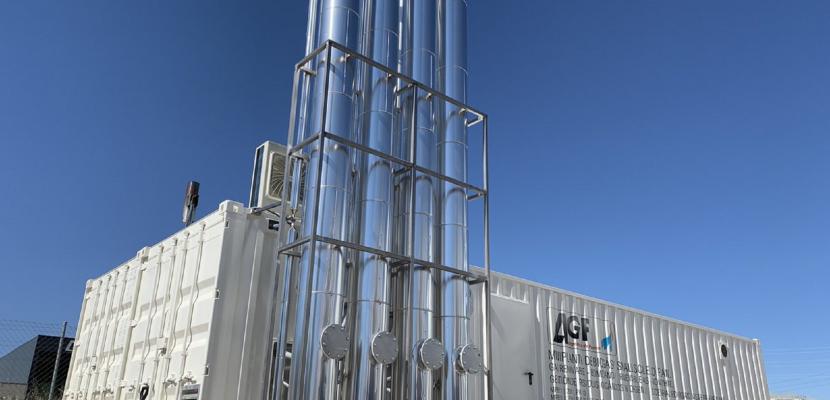Image

LA LAPA´S Mini plant biogas station
Published on 14 December 2020

Spain
Extremadura
This is the good practice's implementation level. It can be national, regional or local.
About this good practice
AGF engineering process is a company whose main experience is in biogas production.
Currently, they are developing research about introducing biogas mini plant stations (MPB) around Spain, the first of these stations, will be placed in “La Lapa”.
This plant wants to reuse the organic wastes of the area to produce biogas.
Two main outstanding differences about the project are:
Firstly, this MPB could be standardized, thanks to the low price and to the serial production, that needs. It could be implemented anywhere, with a low capacity process between 1-3 t/day.
This will allow to distribute MPB around the region, decreasing the carbon footprint needed in the transport of the wastes.
Secondly, this kind of initiative will help to reuse the organic wastes of the community of the area, such as school canteens, supermarkets, etc
Originally this project aim was to reuse the wastes of the industries of the area, nevertheless, locating the MPB in La Lapa was a problem because it did not have enough wastes produced by the industries. Consequently, AGF decided to expand to another type of organic wastes, to include the community into the project.
La Lapa´s project would have started in April 2020, due to the Coronavirus situation it has been delayed until July 2020.
The aim that this project wants to achieve is to produce gas that can be used either for vehicles or to inject in a gas pipeline.
Currently, they are developing research about introducing biogas mini plant stations (MPB) around Spain, the first of these stations, will be placed in “La Lapa”.
This plant wants to reuse the organic wastes of the area to produce biogas.
Two main outstanding differences about the project are:
Firstly, this MPB could be standardized, thanks to the low price and to the serial production, that needs. It could be implemented anywhere, with a low capacity process between 1-3 t/day.
This will allow to distribute MPB around the region, decreasing the carbon footprint needed in the transport of the wastes.
Secondly, this kind of initiative will help to reuse the organic wastes of the community of the area, such as school canteens, supermarkets, etc
Originally this project aim was to reuse the wastes of the industries of the area, nevertheless, locating the MPB in La Lapa was a problem because it did not have enough wastes produced by the industries. Consequently, AGF decided to expand to another type of organic wastes, to include the community into the project.
La Lapa´s project would have started in April 2020, due to the Coronavirus situation it has been delayed until July 2020.
The aim that this project wants to achieve is to produce gas that can be used either for vehicles or to inject in a gas pipeline.
Resources needed
The total cost needed by the project to develop the MPB has been 355.380 €. The aid received to investigate by the Centre of the Development of Industrial Technology CDTI funding was 302.073 €.
Furthermore, AGF signed an agreement with La Lapa´s city council to supply the MPB with 1 t/day of wastes
Furthermore, AGF signed an agreement with La Lapa´s city council to supply the MPB with 1 t/day of wastes
Evidence of success
AGF has installed bigger biogas producers such as:
1º- BIOGASNALIA, in Burgos, with a capacity process of 90 t/day.
Electric power produce > 1000 kW, for thermal self-consumption and saving natural gas.
2º- BIOMETAGAS LA GALENA, in Tarragona, with a capacity process between 100-120 t/day. Electric power produces 1,5 MW, for compressed biomethane.
1º- BIOGASNALIA, in Burgos, with a capacity process of 90 t/day.
Electric power produce > 1000 kW, for thermal self-consumption and saving natural gas.
2º- BIOMETAGAS LA GALENA, in Tarragona, with a capacity process between 100-120 t/day. Electric power produces 1,5 MW, for compressed biomethane.
Potential for learning or transfer
The MPB plant has a high level of replicability, due to several main aspects:
- The standardization of the plant, thanks to the low cost and serial production.
- Easy to transport, due to the small size and the prefabricated system of the plant.
- Easy assembling system, allowing installation anywhere.
- The feeding system has been developed simple and flexible, to simplify one of the more complicated aspects of this kind of plants.
- This plant does not have gas accumulation, to economize this part of the initial investment.
Furthermore, this plant allows installing a circular economy system, reusing the organic wastes of the area to generate gas that can be used for heating and electricity production.
Another point that this project wants to achieve is the same vehicle that would deliver the wastes can be charged with biogas to decrease the carbon footprint of the transport.
- The standardization of the plant, thanks to the low cost and serial production.
- Easy to transport, due to the small size and the prefabricated system of the plant.
- Easy assembling system, allowing installation anywhere.
- The feeding system has been developed simple and flexible, to simplify one of the more complicated aspects of this kind of plants.
- This plant does not have gas accumulation, to economize this part of the initial investment.
Furthermore, this plant allows installing a circular economy system, reusing the organic wastes of the area to generate gas that can be used for heating and electricity production.
Another point that this project wants to achieve is the same vehicle that would deliver the wastes can be charged with biogas to decrease the carbon footprint of the transport.
Further information
Website
Good practice owner
You can contact the good practice owner below for more detailed information.
Organisation
AGF Engineering process ; La Lapa city council; Zafra city council; Badajoz Provincial government.

Spain
Extremadura
Contact
PROJECT MANAGER